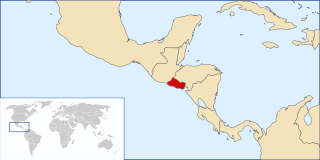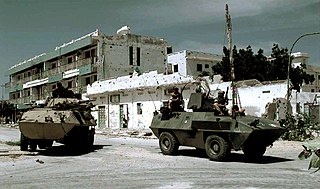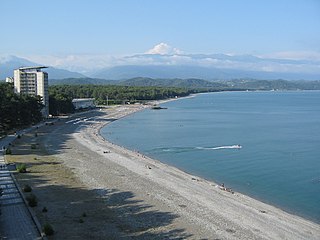ONUCA was a United Nations peacekeeping mission deployed in Central America in 1990 and 1991.

United Nations Security Council resolution 644, adopted unanimously on 7 November 1989, after recalling Resolution 637 (1989), the Council endorsed the report by the Secretary-General and decided to establish the United Nations Observer Group in Central America (ONUCA) in accordance with the report.

United Nations Security Council Resolution 650 was adopted unanimously on 27 March 1990. After recalling resolutions 637 (1989) and 644 (1989), the Security Council endorsed the report by the Secretary-General and decided to authorise an enlargement of the United Nations Observer Group in Central America (ONUCA) in order to demobilise the Contras in Nicaragua.

United Nations Security Council resolution 693 of 20 May 1991 established the United Nations Observer Mission in El Salvador to verify the military-led government of El Salvador and the militia Farabundo Martí National Liberation Front's compliance with human rights in accordance with an agreement both parties signed in San Jose in 1990.

United Nations Security Council resolution 729, adopted unanimously on 14 January 1992, after recalling resolutions 637 (1989), 693 (1991) and 714 (1991), the Council welcomed the conclusion of agreements by the Government of El Salvador and the Farabundo Martí National Liberation Front to bring about an end to the ongoing civil war in El Salvador and the Secretary-General's intention to end the United Nations Observer Mission in El Salvador.

United Nations Security Council resolution 747, adopted unanimously on 24 March 1992, after recalling Resolution 696 (1991) and noting a report by the Secretary-General Boutros Boutros-Ghali, the Council approved the report concerning observations of elections and an enlargement for the United Nations Angola Verification Mission II in Angola.

United Nations Security Council resolution 758, adopted unanimously on 8 June 1992, after reaffirming resolutions 713 (1991), 721 (1991), 724 (1991), 727 (1992), 740 (1992) 743 (1992), 749 (1992), 752 (1992) and 757 (1992), the council, in accordance with a report by the Secretary-General Boutros Boutros-Ghali, decided to enlarge the mandate and strength of the United Nations Protection Force (UNPROFOR) in former Yugoslavia.

United Nations Security Council resolution 772, adopted unanimously on 17 August 1992, after recalling Resolution 765 (1992) concerning the Boipatong massacre in South Africa and a report from the Secretary-General, the Council authorised Boutros Boutros-Ghali to deploy observers to the country after concerns raised in the report, known as the United Nations Observer Mission in South Africa.

United Nations Security Council resolution 775, adopted unanimously on 28 August 1992, after reaffirming resolutions 733 (1992), 746 (1992), 751 (1992) and 767 (1992) considering a report by the Secretary-General Boutros Boutros-Ghali on the ongoing civil war in Somalia, the Council decided to increase the strength of the United Nations Operation in Somalia I by an additional 3,000 personnel.

United Nations Security Council resolution 784, adopted unanimously on 30 October 1992, after recalling resolutions 637 (1989), 693 (1991), 714 (1991) and 729 (1992), the council approved a decision by the Secretary-General Boutros Boutros-Ghali to extend the mandate of the United Nations Observer Mission in El Salvador (ONUSAL) for a further month until 30 November 1992.

United Nations Security Council resolution 791, adopted unanimously on 30 November 1992, after recalling resolutions 637 (1989), 693 (1991), 714 (1991), 729 (1992) and 784 (1992), the Council approved a decision by the Secretary-General Boutros Boutros-Ghali to extend the mandate of the United Nations Observer Mission in El Salvador (ONUSAL) for a further six months until 31 May 1993.

United Nations Security Council resolution 797, adopted unanimously on 16 December 1992, after reaffirming Resolution 782 (1992), the Council decided to establish the United Nations Operation in Mozambique (ONUMOZ) as proposed by the Secretary-General Boutros Boutros-Ghali in line with the peace agreement for Mozambique.

United Nations Security Council resolution 832, adopted unanimously on 27 May 1993, after recalling resolutions 637 (1989), 693 (1991), 714 (1991), 729 (1992), 784 (1992) and 791 (1992), the council noted a report by the Secretary-General Boutros Boutros-Ghali and enlarged the mandate of the United Nations Observer Mission in El Salvador (ONUSAL) to include the observation of the electoral process.

United Nations Security Council resolution 834, adopted unanimously on 1 June 1993, after reaffirming resolutions 696 (1991), 747 (1992), 785 (1992), 793 (1992), 804 (1993), 811 (1993) and 823 (1993), the council indicated its concern at the deteriorating political, military and humanitarian situation in Angola and extended the mandate of the United Nations Angola Verification Mission II for a period of 45 days ending 15 July 1993.

United Nations Security Council resolution 881, adopted unanimously on 4 November 1993, after reaffirming resolutions 849 (1993), 854 (1993), 858 (1993) and 876 (1993) concerning the Georgian–Abkhazian war, the Council extended the mandate of the United Nations Observer Mission in Georgia (UNOMIG) until 31 January 1994.

United Nations Security Council resolution 888, adopted unanimously on 30 November 1993, after recalling resolutions 637 (1989), 693 (1991), 714 (1991), 729 (1992), 784 (1992), 791 (1992) and 832 (1993), the council expressed concern at aspects of the situation in El Salvador and extended the mandate of the United Nations Observer Mission in El Salvador (ONUSAL) until 31 May 1994.
United Nations Security Council resolution 916, adopted unanimously on 5 May 1994, after reaffirming Resolution 782 (1992) and all subsequent resolutions on Mozambique, the council decided to renew the mandate of the United Nations Operation in Mozambique (ONUMOZ) for a final period ending 15 November 1994, and discussed the implementation of the Rome General Peace Accords.
United Nations Security Council resolution 920, adopted unanimously on 26 May 1994, after recalling resolutions 637 (1989), 693 (1991), 714 (1991), 729 (1992), 784 (1992), 791 (1992), 832 (1993), 888 (1993), the council discussed the implementation of peace agreements in El Salvador and extended the mandate of the United Nations Observer Mission in El Salvador (ONUSAL) until 30 November 1994.

United Nations Security Council resolution 961 was adopted unanimously on 23 November 1994, after recalling resolutions 637 (1989), 693 (1991), 714 (1991), 729 (1992), 784 (1992), 791 (1992), 832 (1993), 888 (1993) and 920 (1994), the council discussed the implementation of peace agreements in El Salvador and extended the mandate of the United Nations Observer Mission in El Salvador (ONUSAL) for a final time until 30 April 1995.

United Nations Security Council resolution 968, adopted unanimously on 16 December 1994, after noting statements by the president of the security council and reports by the Secretary-General Boutros Boutros-Ghali on the situation in Tajikistan, the council established the United Nations Mission of Observers in Tajikistan (UNMOT) and addressed the process of national reconciliation in the country.















